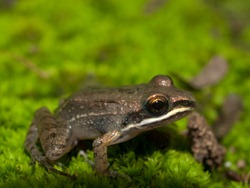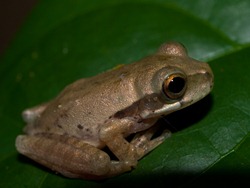The froglets were emerging from the wetland around the same time. Although Leptodactylus melanonotus was a couple weeks ahead, L. poecilochilus, Smilisca baudinii, and Hypopachus variolosus emerged very close to one another, and these three differ markedly in their morphology and, presumably, feeding behavior. The co-generic species are obviously much more similar to one another than to the others, and could be foraging on similar prey or in similar habitat. Is there a reason for this anecdotally observed pattern? Are the co-generic species emerging at different times to avoid competition?


